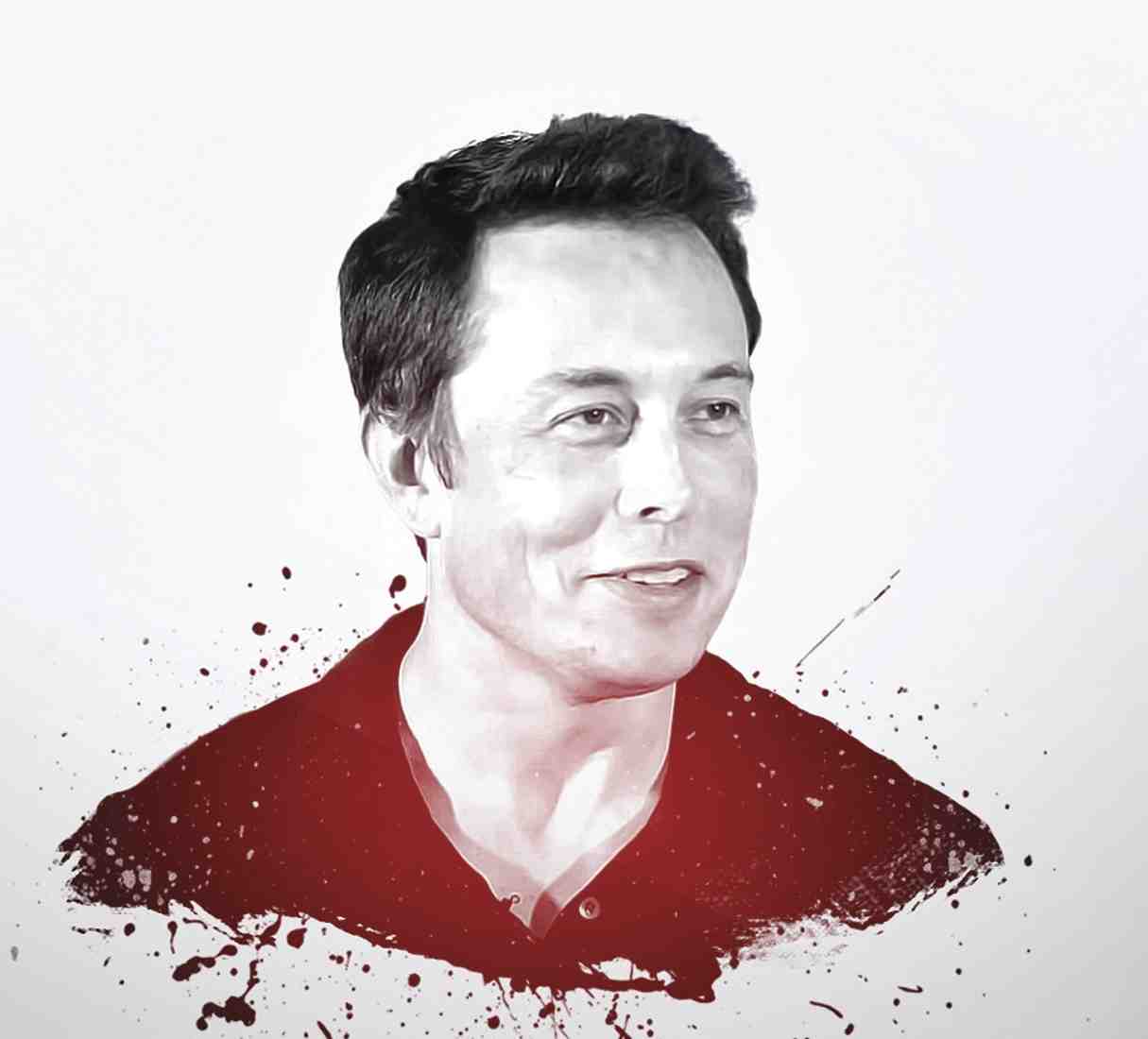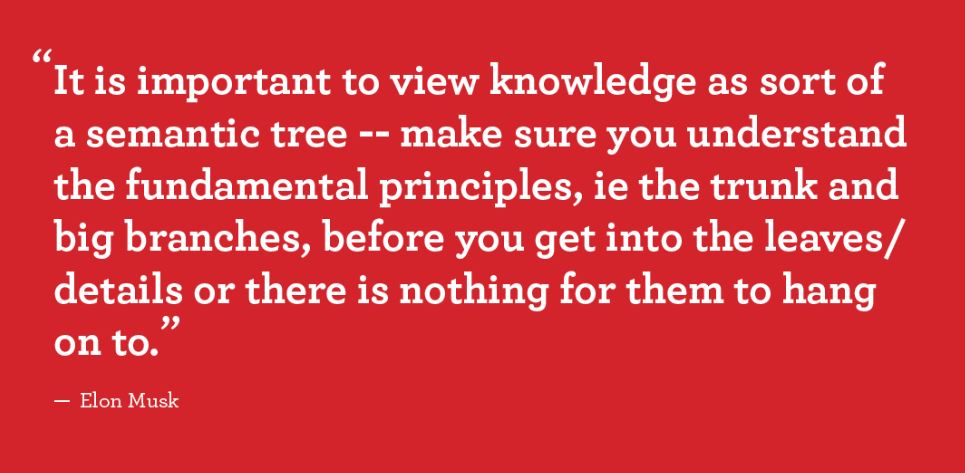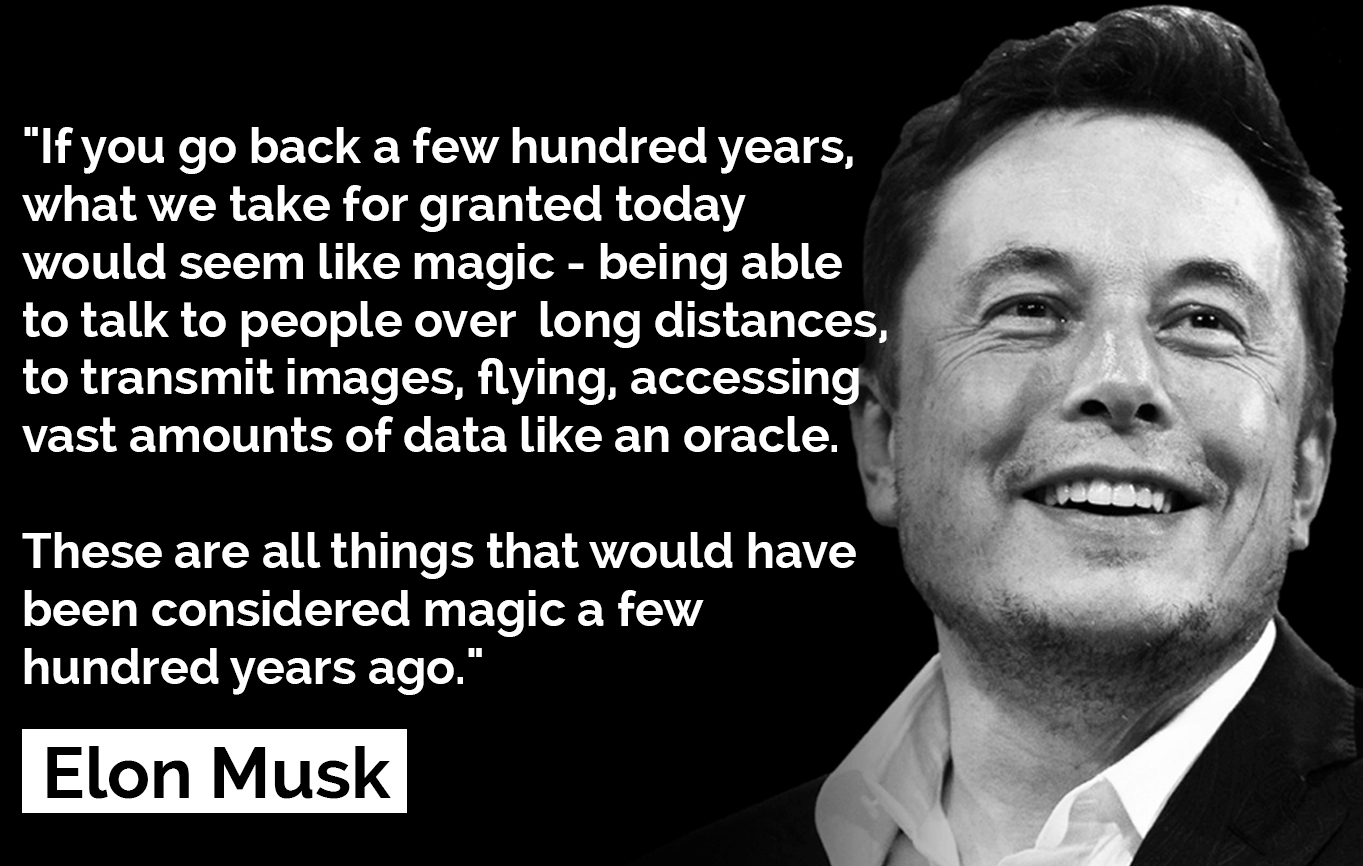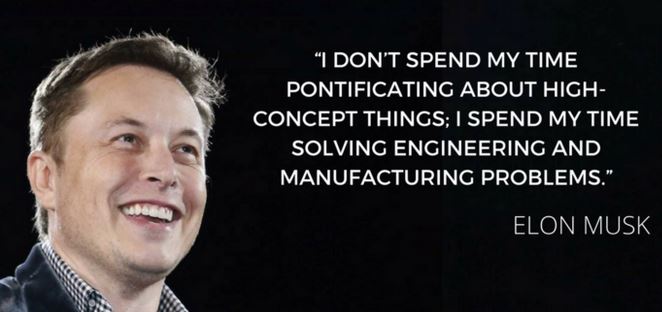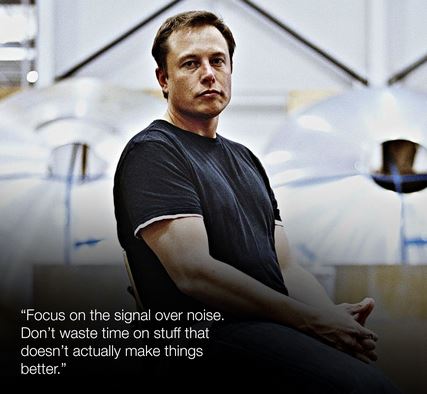Elon Musk
Ordinary People Can Choose To Be Extraordinary
Elon Musk - Introduction
Elon Musk is an extraordinary man.
He has founded, co-founded, and leads a cross-section of the world's most technically innovative companies. His first major commercial success was Paypal which he co-founded and sold.
Elon Musk is the co-founder and CEO of Tesla, and leads all product design, engineering and global manufacturing of the company's electric vehicles, battery products and solar energy products.
He is CEO and Chief Technical Officer at SpaceX, and oversees the development of rockets and spacecraft for missions to orbit Earth and eventually to other planets.
Elon Musk is founder and CEO of Neuralink, which is developing ultra-high bandwidth brain-machine interfaces to connect the human brain to computers.
He also launched The Boring Company, which combines fast, affordable tunneling technology with an all-electric public transportation system in order to alleviate urban congestion and enable high-speed, long-distance travel.
For a more in-depth look at Elon Musk's activities see:
8 Industries Being Disrupted By Elon Musk And His Companies
If you want an indepth and totally facinating read on Elon Musk's early years written by Tim Urban and based on extensive face-to-face meetings with Musk read here.
The core theme and intention of this site is to show you how to think effectively and especially when coping with tough times.
In that context I
believe that Elon Musk has much to teach us.
One of the most interesting things about Elon Musk is the thought processes that lead to his ideas and innovations, followed by his skill, persistence and patience to see them through to implementation.
Realistically,
it is extremely unlikely that you have any desire or aspiration to start a
business in the way that he has done, and your vision may not be on the
same scale as his, but the purpose of this article is to extract the key principles from his thought processes and learn from his:
- Learning Skills
- Thinking Skills
- Productivity Skills
Elon Musk - Learning Skills
There are 3 key elements to Elon Musk's learning skills and these
form the foundation upon which he is able to exercise his critical
thinking skills.
[1] Know A Lot About A Lot
The technical description of this is someone who is an "Expert Generalist".
Elon Musk read widely and extensively when he was younger, allegedly 2 books a day across a very wide range of subjects including science fiction, philosophy, religion, programming, and biographies of scientists, engineers, and entrepreneurs.
As he got older, his reading and career interests spread to physics, engineering, product design, business, technology, and energy.
Few people are well informed across a range of subjects. The traditional focus of further and higher education is to specialise in one specific and narrow field and to master that.
The key take away on this point is extend and expand the scope of your reading.
[2] Know How It All Hangs Together
Simply absorbing a mountain of pieces of disparate pieces of information is rather like having a book or a website without an index. The information is hard to access and thus harder to co-relate and almost impossible to apply, so in practical terms it is largely useless.
People with minds stuffed full of disconnected information that they can not apply have been referred to as "educated derelicts". Intelligent people are those who can act and behave intelligently. That is to say, they "know how it all hangs together" and, equally importantly, know how to apply it.
Elon Musk describes his process of knowing how things hang together:
Charlie Munger describes this process as one of creating mental models which are a high level representation, or overview, of how something works.
Since it is impossible to keep all of the details of all of the information that you absorb in your brain, you use models to simplify the complex into understandable and organisable chunks.
Mental models shape how you reason and how you understand, and they also shape the connections and opportunities that you see, and also why you consider some things more relevant than others.
The key take away on this point is to make sure that you have a good understanding - a good mental model - of how something works and hangs together. This way, everything that you read and learn on any particular subject fits into place within that mental model.
[3] Know How To Apply Core Principles From One Field Of Knowledge To Another
Bringing points one and two together: as you extend and expand your reading and learning across a wide range of subjects your brain is automatically building an extended network of mental models.
Charlie Munger describes this as a latticework of mental models spanning many different domains of information and experience then you can apply core principles from one field to another.
Munger outlines a simple and practical approach to help you learn how to build mental models.
This is what educational psychologists refer to as a "learning transfer", where we take what we learn in one context and apply it to another.
Elon Musk has mastered this process and he has a two-step process for fostering learning transfer:
[1] He deconstructs knowledge into the underlying fundamental principles.
In essence this process involves removing as much context specific information as possible, and in a sense going beyond the words and surface meaning to the core generic and abstract essence of the principles that can be applied in another totally different context.
This is largely a reflective and intuitive process that is all about seeing connections across traditional boundaries, by thinking by analogy and asking yourself questions such as: “What does this remind me of?” and “Why does it remind me of it?”
[2] He reconstructs the fundamental principles into new fields.
So for example he reconstructed the foundational principles he’s learned in artificial intelligence, technology, physics, and engineering into separate fields:
- In aerospace in order to create SpaceX
- In automotive in order to create Tesla with self-driving features
- In trains in order to envision the Hyperloop
- In aviation in order to envision electric aircraft that take off and land vertically
- In technology in order to envision a neural lace that interfaces your brain
Elon Musk - Thinking Skills
Underpinning all of Elon Musk's innovative solutions is First Principles Thinking which he breaks down into 3 steps.
First Principles Thinking
1. Identify the problem and its common assumptions
Musk gives an example:
’Battery packs are really expensive, and that’s just the way they will always be. Historically, it has cost $600 per kilowatt hour,” he said, referencing the common assumption about car batteries.
He then went on to say that most people would just accept that:
“it’s not going to be much better than that in the future.”
2. Break the problem down to its fundamental truths
This is the hard part. As with so many things in life the key is to ask the right questions, questions that will challenge these common assumptions.
You have to persist with this line of enquiry until you are left with only the fundamental truths.
So to continue with the example of batteries, Musk asks:
"What are the material constituents of the
batteries? What is the stock market value of the material constituents?’
It’s got cobalt, nickel, aluminum, carbon, some polymers for separation
and a seal can...”
Then, he continued:
“...you’d break that down on a material basis and say, ‘If we bought that on the London Metal Exchange what would each of those things cost?’ It’s like $80 per kilowatt hour.”
3. Use the fundamental truths to plot a new course.
Once you have identified the fundamental truths, you use them like building blocks to create a totally new, innovative solution.
So, to conclude with the example of the the batteries, Musk says:
“...you just need to think of clever ways to take those materials and combine them into the shape of a battery cell. Then you can have batteries that are much, much cheaper than anyone realizes.”
Optimise Function and Ignore Form
James Clear, the author of "Atomic Habits" analyses Musk's use of first principles thinking:
"Be wary of the ideas you inherit. Old conventions and previous forms are often accepted without question and, once accepted, they set a boundary around creativity.
This difference is one of the key distinctions between continuous improvement and first principles thinking.
Continuous improvement tends to occur within the boundary set by the original vision. By comparison, first principles thinking requires you to abandon your allegiance to previous forms and put the function front and center.
What are you trying to accomplish? What is the functional outcome you are looking to achieve?
Optimize the function. Ignore the form."
First Principles: Elon Musk on the Power of Thinking for Yourself
Closing remarks on first principles thinking
"I think generally people’s thinking process is too bound by
convention or analogy to prior experiences. It’s rare that people try to
think of something on a first principles basis. They’ll say, 'We’ll do
that because it’s always been done that way.' Or they’ll not do it
because 'Well, nobody’s ever done that, so it must not be good.' But
that’s just a ridiculous way to think. You have to build up the
reasoning from the ground up—'from the first principles” is the phrase
that’s used in physics. You look at the fundamentals and construct your
reasoning from that, and then you see if you have a conclusion that
works or doesn’t work, and it may or may not be different from what
people have done in the past."
People believe thinking outside the box takes intelligence and creativity, but it’s mostly about independence.
When you simply ignore the box and build your reasoning from scratch, whether you’re brilliant or not, you end up with a unique conclusion—one that may or may not fall within the box.
If you really want a deeper look into Musk’s mind and reasoning by first principles, read this indepth, idiosyncratic, brilliant (and very long) article:
The Cook and the Chef: Musk’s Secret Sauce
Critical Thinking - Phases
Elon Musk knows that the root of innovation is a preparedness to question the way things have always been done and ask if there is a better, more efficient, more beneficial way to accomplish these tasks:
“Constantly think about how you could be doing things better, and keep questioning yourself...
...I'm always looking for what's wrong… in order to make [Teslas] better ... I have to think very critically. So, when I see the car, I see all the things that I think need to be fixed to make it better."
Amazon founder Jeff Bezos has noted that the smartest people are constantly revising their understanding and reconsidering a problem they thought they'd already solved:
"They're open to new points of view, new information, new ideas, contradictions, and challenges to their own way of thinking."
That's good critical thinking, the ability to learn from ideas and thoughts, even if they are in opposition to your own.
So, how can you learn how to think critically?
ENVISIONING
This is about having the ability to:
- Envision the future
- "Fast forward"
- Look at the bigger picture
- Imagine alternative futures.
- Set stretching goals
- Set transcendent goals
SCHEDULING
- Don't rush
- Critical thinking is hard work
- Block out time in your calendar to engage in deep thought
- Exercise patience and emotional intelligence
BREWING
You'll
often benefit by walking away and letting all the facts settle in your mind and simmer and brew.
- Set a time limit to think things through
- Never make a decision late at night
- Pay attention to negative feedback
- Don't defend yourself or close your mind
- Ask what can I learn from this?
CONNECTING
Opportunities reveal themselves to you when you can see the interconnection and/or interdependence of things that others cannot see.
For example, Elon Musk saw such a connection when he realised that SpaceEx could build a rocket to run on methane
(CH4) which would give it enough range to reach Mars AND be able to return by creating the fuel from the return journey using the carbon dioxide, permafrost [water] and liquid oxygen.
Seeing this connection transformed the long-term economics of space travel between Earth and Mars because it means that you could send manned spacecraft to Mars without having to carry rocket fuel with you.
PERSISTING
When Elon Musk’s SpaceX company tried to launch its first rocket, it did not succeed. There two more further attempts and each time the rocket didn’t launch.
Musk was on the brink of losing all investment, he tried one more time and finally succeeded in launching a rocket and the SpaceX name.
He describes his attitude to failure:
“If something is important enough you should try, even if the probable outcome is failure.”
So, don’t just try, try because you believe so much in the outcome you are trying for.
PERSUADING
As an innovator you will run into the problem that innovative ideas will always inconsistent with prevailing belief and logic.
The ability to influence others to see your view, and reconsider their logic and beliefs, is critical.
Elon Musk is persuasive, trusting his own internal logic and instincts in the face of intense pushback.
Elon Musk - Productivity Skills
The first 6 minutes of this interview are a mini-masterclass in productivity skills.
Highlights:
- If a [engineering design] process is taking too long its wrong.
- Musk's the chief engineer - yet everyone's a chief engineer.
- Everyone knows everything about all systems [involved in overall design].
- There is no subsystem optimisation [in isolation to the whole system].
- Product errors reflect organisation errors.
- The trap that design engineers fall into - is optimising something that shouldn't exist.
- When framing a question - the start point to it is: "This question is wrong!"
- The hard part is framing the question - the point at which you can properly frame the question - the answer is easy.
Here in Elon Musk's own words are a number of observations about his attitudes and behaviours regarding productivity.
This is not intended to be an exhaustive list and it does not include all the usual things you would expect to see on such a list.
What we are focused on here are points of difference that set Elon Musk apart.
“I don’t spend my time pontificating about high-concept things; I spend my time solving engineering and manufacturing problems.”
"I was at one point thinking about doing physics as a career—I did undergrad in physics—but in order to really advance physics these days, you need the data.
Physics is fundamentally governed by the progress of engineering.
This debate—“Which is better, engineers or scientists? Aren’t scientists better? Wasn’t Einstein the smartest person?”—personally, I think that engineering is better because in the absence of the engineering, you do not have the data.
You just hit a limit. And yeah, you can be real smart within the context of the limit of the data you have, but unless you have a way to get more data, you can’t make progress.
Like look at Galileo. He engineered the telescope—that’s what allowed him to see that Jupiter had moons.
The limiting factor, if you will, is the engineering. And if you want to advance civilization, you must address the limiting factor. Therefore, you must address the engineering."
“Focus on signal over noise. Don’t waste time on stuff that doesn’t actually make things better."
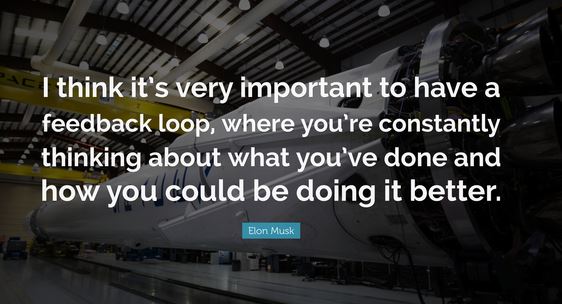
“I think it’s very important to have a feedback loop, where you’re constantly thinking about what you’ve done and how you could be doing it better.
I think that’s the single best piece of advice: constantly think about how you could be doing things better and questioning yourself.”
“Don’t tell me what you like, tell me what you don’t like.”
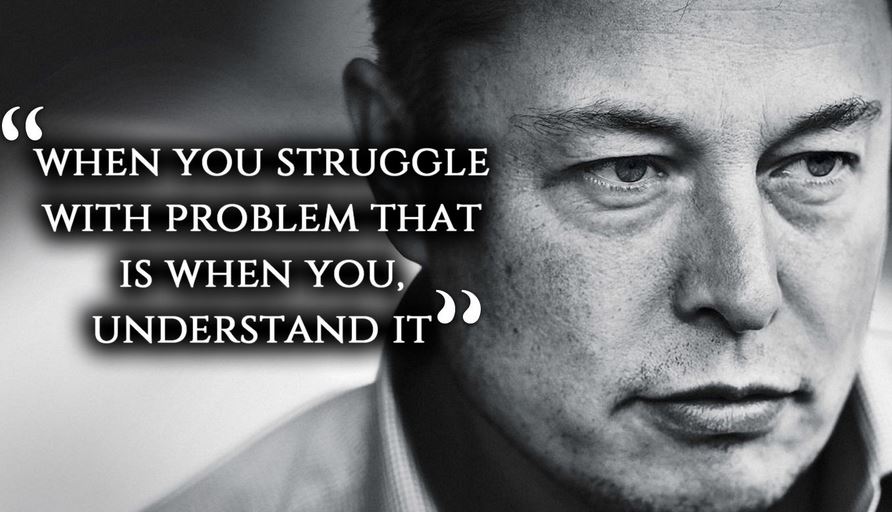
"When you struggle with a problem that is when you understand it."
Progress comes from being focused and performing deep work.
This means living as asynchronously as possible and with minimal interruptions from co-workers.
NOTE: I really do recommend you check out: "Deep Work" and bookmark it. This mode and process of thinking is exactly what Elon Musk spends much of his quality time engaged in.
If this is your one actionable take away from this article it will be the most productive thing you can do.
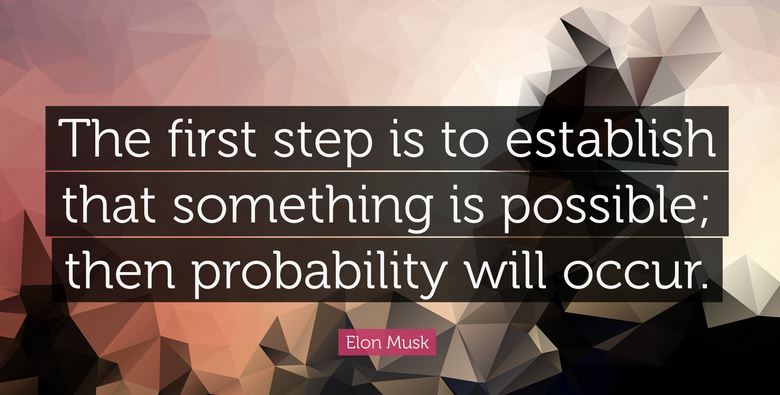
“The first step is to establish that something is possible; then probability will occur.”
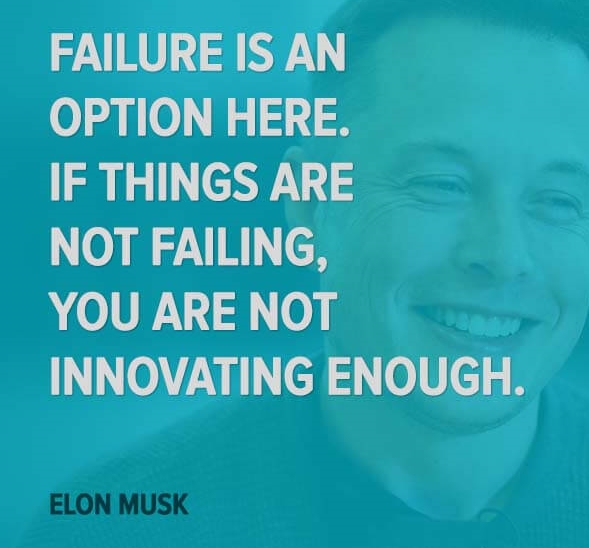
“Failure is an option here. If things are not failing, you are not innovating enough.”
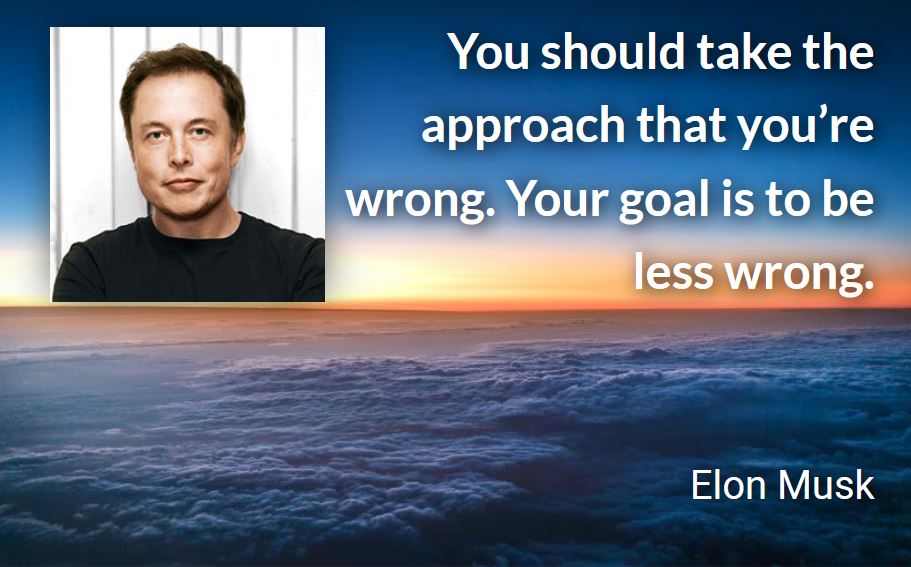
“You should take the approach that you’re wrong. Your goal is to be less wrong”
Elon Musk - Inspirational
In this article we have deliberately focused on the rational and mental side of Elon Musk in an attempt to highlight clearly key aspects of how he thinks and to do so in a way that makes this accessible to anyone reading this.
I want to close the article with a couple of videos that show his emotional and human side.
Elon Musk - Against All Odds
Elon Musk - You Can Also Be Great
Return to: Inspirational People
Return to: Thinking Skills
LATEST ARTICLES
Living in Survival Mode Without Surrendering Mental Authority
Living in Survival Mode Without Surrendering Mental Authority
 Clear Thinking When You’re Just Trying to Stay Afloat. Many people today are overwhelmed because they are living in survival mode - not temporarily, but as a persistent condition of life. For many, th…
Clear Thinking When You’re Just Trying to Stay Afloat. Many people today are overwhelmed because they are living in survival mode - not temporarily, but as a persistent condition of life. For many, th…Manifestation Without Magic: A Practical Model
 Manifestation without magic is not a softer or more intellectual version of popular manifestation culture. It is a different model altogether. Popular manifestation teachings tend to frame reality as…
Manifestation without magic is not a softer or more intellectual version of popular manifestation culture. It is a different model altogether. Popular manifestation teachings tend to frame reality as…Staying Committed When You Can't See Progress - The Psychology of Grit
 Uncertainty Is Not The Absence Of Progress, Only The Absence Of Reassurance. One of the most destabilising experiences in modern life is not failure, but uncertainty and staying committed when you can…
Uncertainty Is Not The Absence Of Progress, Only The Absence Of Reassurance. One of the most destabilising experiences in modern life is not failure, but uncertainty and staying committed when you can…The Battle For Your Mind - How To Win Inner Freedom In A Digital Age Of Distraction
 From External Events to Inner Events. We often think of “events” as things that happen out there: the traffic jam, the rude comment, the delayed email reply. But what truly shapes our experience is wh…
From External Events to Inner Events. We often think of “events” as things that happen out there: the traffic jam, the rude comment, the delayed email reply. But what truly shapes our experience is wh…How to See Your Thoughts Without Becoming the Story
 A Practical Guide to Thought-Awareness. You can spend your life inside the stories of your mind without ever learning how to see your thoughts clearly and objectively. Most of the stuff we tell oursel…
A Practical Guide to Thought-Awareness. You can spend your life inside the stories of your mind without ever learning how to see your thoughts clearly and objectively. Most of the stuff we tell oursel…The Collison Decision Matrix - A Simple Framework for Better Choices
 The Collison Decision Matrix Is A Practical Everyday Thinking Tool. Most of us spend a surprising amount of time worrying about decisions. From small ones such as what to wear, what to eat, what to te…
The Collison Decision Matrix Is A Practical Everyday Thinking Tool. Most of us spend a surprising amount of time worrying about decisions. From small ones such as what to wear, what to eat, what to te…The Power Of Asking The Right Question
 The Power Of Asking The Right Question Lies In The Quest For Insight. To experience the power of asking the right question you must develop the practice of asking questions. The best way to improve th…
The Power Of Asking The Right Question Lies In The Quest For Insight. To experience the power of asking the right question you must develop the practice of asking questions. The best way to improve th…Site Pathways
 Here is a site pathway to help new readers of Zen-Tools navigate the material on this site. Each pathway is based around one of the many key themes covered on this site and contain a 150 word introduc…
Here is a site pathway to help new readers of Zen-Tools navigate the material on this site. Each pathway is based around one of the many key themes covered on this site and contain a 150 word introduc…How To Live With Contradiction - Beyond Thought Let Stillness Speak
 A major impact on so many peoples' lives is the situational contradiction of unfilled realistic expectations. So where does all this leave us? Well here we are, with mental equipment that is more lim…
A major impact on so many peoples' lives is the situational contradiction of unfilled realistic expectations. So where does all this leave us? Well here we are, with mental equipment that is more lim…How To Trust The Process Of Mindfulness - Right Now
 In mindfulness, the process isn’t some distant goal — it's what is happening right now. When we talk about how to trust the process of mindfulness the credibility of the process is heavily dependent…
In mindfulness, the process isn’t some distant goal — it's what is happening right now. When we talk about how to trust the process of mindfulness the credibility of the process is heavily dependent…Inner Mastery For Outer Impact - Mental Clarity For Effective Action
 Insights only matter if they translate into consistent action. In a world crowded with quick fixes and motivational soundbites, the theme “Inner Mastery for Outer Impact” calls us to something more e…
Insights only matter if they translate into consistent action. In a world crowded with quick fixes and motivational soundbites, the theme “Inner Mastery for Outer Impact” calls us to something more e…
